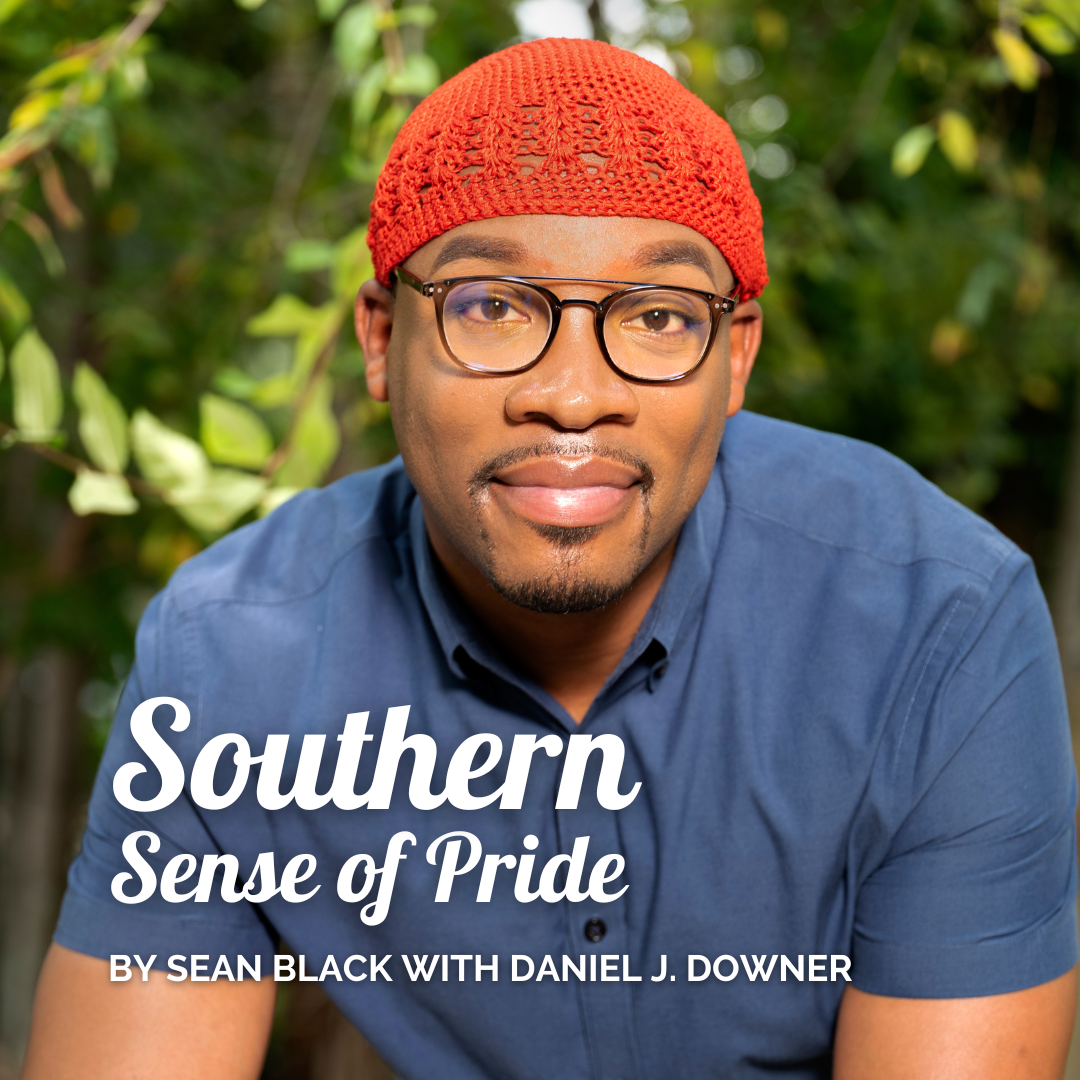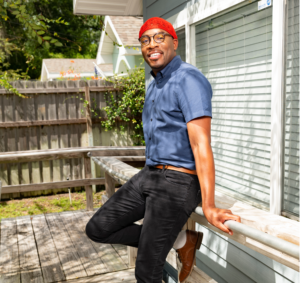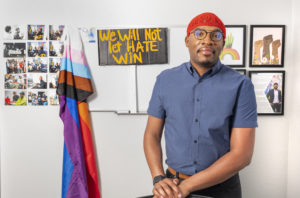COMPASS Initiative® Funds 32 Organizations to Transform the HIV Epidemic in the South
Atlanta, Georgia (November 30, 2018) – In recognition of the 30th anniversary of World AIDS Day and in support of


By Sean Black with Daniel J. Downer
Founder and Executive Director of the Bros In Convo Initiative, a Black, Queer-led Community Organization in Orlando, Florida, Daniel J. Downer is infusing professional know-how with diversity, cultural inclusiveness, and most importantly his own lived-experience.
“Music has always been a part of my life,” reveals the 33-year-old, exec over Zoom before catching a flight to Asheville’s Blue Ridge Mountains for a weekend of R&R and to hear Trevor Hall, one of his favorite folk artists. This was our second interview after a welcoming tour of Stafford House, The Bros in Convo Initiative’s LGBTQ drop-in space operated in partnership with Miracle of Love, Inc, Central Florida’s largest and oldest minority non-profit organization. It is here where Daniel began The Bros in Convo Initiative in 2017 to help educate and empower gay and queer individuals of color like himself.
“I understand some of the hardships that gay and queer individuals of color experience, I know what it’s like to be homeless. I know what it is like to have gone days with nothing to eat. I know what it is like being constantly judged.”
He’s persevered through hard times and possesses a unique and critical, firsthand perspective, key in community-led organizations poised to end HIV. The Bros in Convo Initiative was recently highlighted in HIV.gov’s continuing series #NHASEverywhere featuring the work being done in communities across the nation to help reach the goals of the National HIV/AIDS Strategy (2022 -2025) (NHAS). The Bros in Convo Initiative’s programming aligns with NHAS objective 3.3: Engage, employ, and provide public leadership opportunities at all levels for people with or who experience risk for HIV. For example, they have adapted and expanded their capacity-building programming to include ELEVATE, a leadership development training program for people of color living with HIV in collaboration with the Florida Department of Health. The program provided participants with mentorship, skills, and tools for becoming actively engaged in planning bodies and other efforts to address the goals of the NHAS.
Knowing to also take time to recharge and to nurture his soul, it’s no wonder that community advocate Daniel J. Downer is succeeding in his role and garnering serious props. Lauded for strides in health, racial and social equity, Daniel has been recognized by distinguished industry leaders such as GLAAD (2018) and The Red Door Foundation (2019) and he has earned accolades including The Demetrick Brown Humanitarian Award, Watermark’s Most Remarkable Persons in Central Florida (both 2020) and the Orlando Trailblazer Award presented in 2021 at the annual Harvey Milk Breakfast & LGBT+ Center Diversity Awards. He’s a contributing author for the HIV/AIDS Online Resource TheBody.com.

Known for his bright smile and signature kufi hats denoting his Black Muslim faith, Daniel’s specific responsibilities include building the organization’s capacity to implement new programming, program evaluation, leadership development, and rapid response to community needs. He also leads the formation of new strategic partnerships and is part of the driving force behind the organization securing new resources and funding to continue to not only sustain but build the organization’s goals.
His “calling” he explains coupled with his knack for business and leadership happened while attending Oglethorpe University, a private liberal arts college just outside Atlanta, Georgia. While working toward his B.A. in African America Studies and Chorale Music, Daniel worked as a Support Coordinator for the Metro Atlanta Task Force for The Homeless known in the community as “Peachtree & Pine.”
Growing up in a conservative Christian [and Southern] household, the majority of his early childhood and adolescent years were spent as a Minister’s Kid, heavily involved in various church activities, in particular leading the Music and Youth Ministries.
“I began the difficult work of checking my own internalized homophobia as I was coming more into my Queerness.”
Today, Daniel is helping his LGBTQ peers address the high rates of new HIV diagnoses in the South, one of the hardest hit areas in the United States. AIDSvu.org reports in 2019, 474,786 people were living with HIV in the South while 19,100 people were newly diagnosed with HIV. Black people comprise 50.4% of these new HIV diagnoses, more than double that of Hispanics/Latinx (24.4%) and Whites (21.6%). Additionally, these data show that Black people made up 14% of prevention efforts in 2021, but 42% of new HIV diagnoses in 2020, while white people made up 65% of prevention efforts in 2021 and 25% of new HIV diagnoses in 2020.
“We know that prevention is highly effective in reducing HIV transmission, shares Downer. But I think it is important for public health officials to intentionally create sociocultural appropriate messaging when it comes to gay and queer individuals of color but also to intentionally build a public health infrastructure that is low barrier when it comes to access to prevention and positively supports gay and queer individuals of color that are seeking prevention efforts.”

In time for Southern HIV/AIDS Awareness Day, (August 20th), COMPASS Initiative Partner and grantee Daniel J. Downer opens-up about the loving the South despite the challenges of growing up gay, his perseverance to causes which he’s passionate about, and the transformative journey that turned public service work into self-discovery and healing.
SB: Why Asheville?
DD: I’ve gone to Asheville plenty of times, so it feels like home. I’m going to hear Trevor Hall, an American folk singer-songwriter who infuses folk music with reggae and a little electronic, pop, rock, and soul, so I’m excited to see him in concert. I have always enjoyed going to Asheville because the vibe is very chill, it feels like a sanctuary where I can find respite and recharge and enjoy nature, eat good food, and to be amongst beautiful kind people.
SB: What is it about the South that you embrace?
DD: Southern hospitality is a real thing. There is nothing else in the World like it. I also think there is a lot of beauty in our culture whether its bonfire dances during the summer or church which is a very big part of Southern culture or simply Southern cuisine, the delicious spectrum of savory and sweet food we have in the South. I think there is a lot to appreciate about the South.
SB: You’re from the South, Florida, correct?
DD: I was born and raised in Central Florida so I am one of very few folks who can say they are a native not a transplant. I have lived all my life in Central Florida except the time I spent in undergrad in Atlanta Georgia.
SB: Tell me about your religious upbringing?
DD: I am formerly a minister’s kid and was very active in a lot of the programming at our church which included youth services like Boy Scouts and Girl Scouts program and then the music ministry. My original dream was to either be an African America Studies teacher or a Chorale instructor because I come from a family with a very strong music background whether that was singing in choruses or playing various instruments so that is why I minored in chorale education at Oglethorpe. Music has always been a part of my life, especially instrumentation. I grew up playing the guitar, piano, and trombone. My family was very conservative with the musical genres that we could listen to. We were only allowed to listen to Contemporary Christian and Gospel music which included Southern Gospel and then Country music, because southern Gospel was an infusion of Gospel and Country music; But I could remember very early on whenever I got to visit extended family who were not connected to the church being able to listen to funk and soul and finding a love for Jazz music and really loving R&B music and then also Classical Music, which was another music genre that my parents allowed to be played in the house.
SB: We’ve connected over social media specifically Instagram. Can you tell me why you feel it’s important to connect.
DD: Its interesting because I’ve only been on social media fairly recently since 2017 when I started my Facebook and Instagram. I got on social media because quite frankly, when I was rolling out The Bros in Convo Initiative my mentors were like you also need to be on social media. Individuals want to be able to connect to the person behind the cause, so that’s really what prompted me to get on social media and it really has been a great way to create awareness around specific topics or events or causes or whatever it is that I am wanting to amplify and promote. It’s also been a great way to connect and find community and it’s a great way to stay current with what is happening. I have definitely benefited from it; my organization has definitely benefited from it too. The communities that we serve are very much connected to social media, so being able to stay current with the times has been very helpful for us in creating impact and engagement.
SB: Talk to me about the Parramore neighborhood Stafford House serve?
DD: Yes, I would say that is one of the very first things that when Stafford House was being dreamed about was making sure that it was in the community who it was designed to serve. Our organization really prioritizes itself on centering gay and queer individuals of color and being able to help them find and build community, help educate them, empower them, and increase their access to various resources. We have definitely seen the community benefit from Stafford House located in the Parramore neighborhood; individuals know that they can come to the space and utilize the computers at our Smart Lounge to check emails, connect to social media, print off their resumes, complete their Food Stamp or Medicaid application. They have access to the printer and the copier or the fax that they may not necessarily have access to at home. Being able to use free WIFI something we take for granted but in certain communities WIFI is a privilege. They also know they can come if they need a snack or a cold beverage or even a hot meal. So we really see where the community has really embraced and utilized the space whether it is for the things I’ve mentioned or for the programs and services that we provide there.
SB: Can you think of any unique ways of ending HIV and realizing the NHAS?
DD: Yes, I think one of the things that makes The Bros in Convo Initiative very unique – we are 100% community driven and so everything from our marketing material to our programming services all of our initiatives are driven by community and in many different ways. Whether through focus groups that we conduct or our monthly our Community Advisory Board which I like to say to folks has more power than our own Board of Directors. We really try to think about all the various tenants that make up the existence of black and brown folk within the LGBTQ community; we talk about transportation and how do we make transportation equitable to all of the individuals who want to access our programs and services. More than just providing them a bus card or sending them an Uber, how about those individuals who might need para transportation or how are we ensuring that our space has a walkable sidewalk for pedestrians? We look at the nuances. Looking at how we can provide meals to individuals who need food but not only provide meals but how do we teach them how to prepare these meals and build upon that and provide them with the equipment they need in their homes, like a mixer or a vegetable food chopper? So I think what we’ve done really well is leaning into community and asking what do you really need in order to be your best and healthiest self and with the limited resources that we have really try to meet those needs or remove those barriers so that we can increase access to various prevention services and programs and care services and programs that we provide.
For more about Daniel Log-on to his website at www.danieljdowner.com:
Daniel sits on the Board of Directors of RAHMA, a Black Muslim-led organization addressing HIV/AIDS in faith communities through education, advocacy, and empowerment. The Grants Committee of Contigo Fund is a philanthropic effort to strengthen and network existing agencies and to identify and support grassroots efforts that advance Latinx and LGBTQ causes and the intersection of these two communities. And the Board of Directors of One Orlando Alliance, a vital support network for LGBTQ+ organizations in Central Florida. Daniel is the co-creator and Advisory Council Member of the Black Boardroom Leadership Institute, a one-of-a-kind leadership training program that brings together both nonprofit organizations and leaders with a goal to guide culture change and create an ideal environment of inclusion of diverse voices in service to boards.
Sean Black is an HIV+ Queer art-activist, journalist and educator. He is open about his struggles with addiction.
Atlanta, Georgia (November 30, 2018) – In recognition of the 30th anniversary of World AIDS Day and in support of
Our first contributors need no introduction. Well-known in their respective fields, Patrick Sullivan, PhD, DVM, Nic Carlisle, JD, and Samira
Column By: Tiffany Smith Tiffany lives in Atlanta, GA and works with the Emory COMPASS Coordinating Center. She previously worked
Column By: Tiffany Smith Tiffany lives in Atlanta, GA and works with the Emory COMPASS Coordinating Center. She previously worked
©2024 Emory University, Inc. All rights reserved.
When you click this link, you will be directed to an external webpage hosted by LearnUpon LMS.
Kindly note that registration is required, and it’s entirely free of charge.
To access the learning modules, you will need to create a new login, as this platform operates independently and is not affiliated or connected with OpenWater or any other platforms used by the Gilead COMPASS Initiative®.